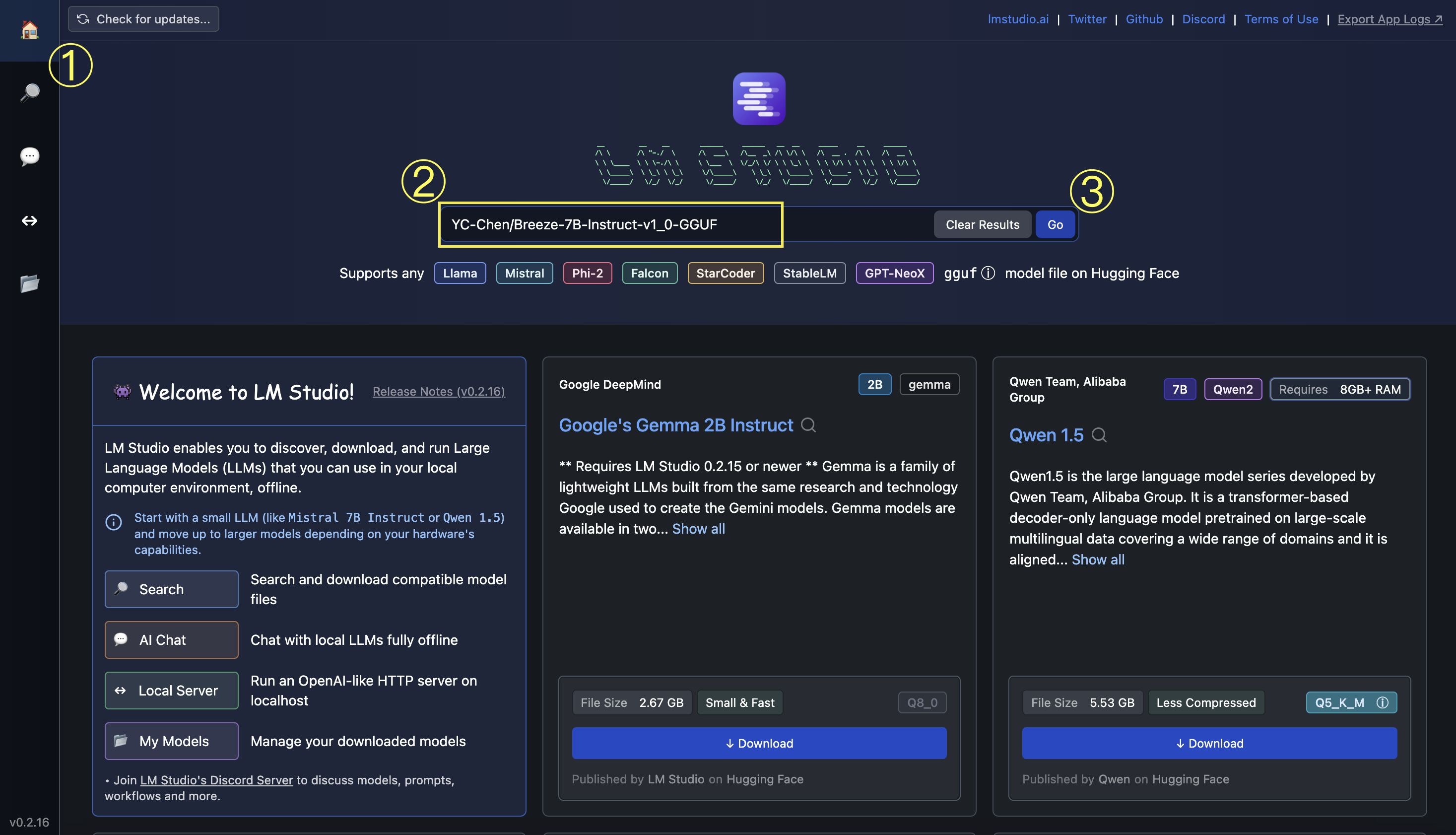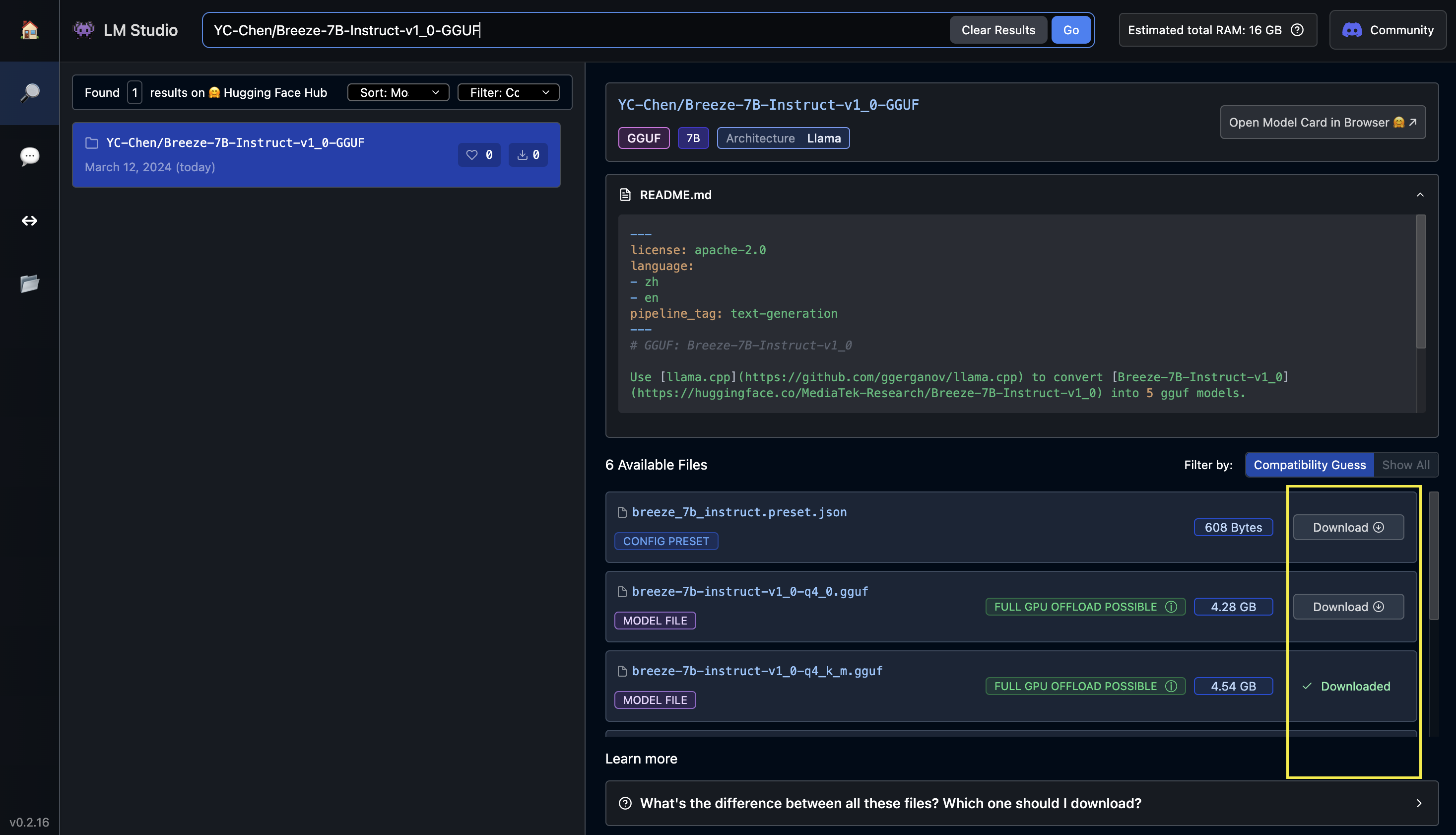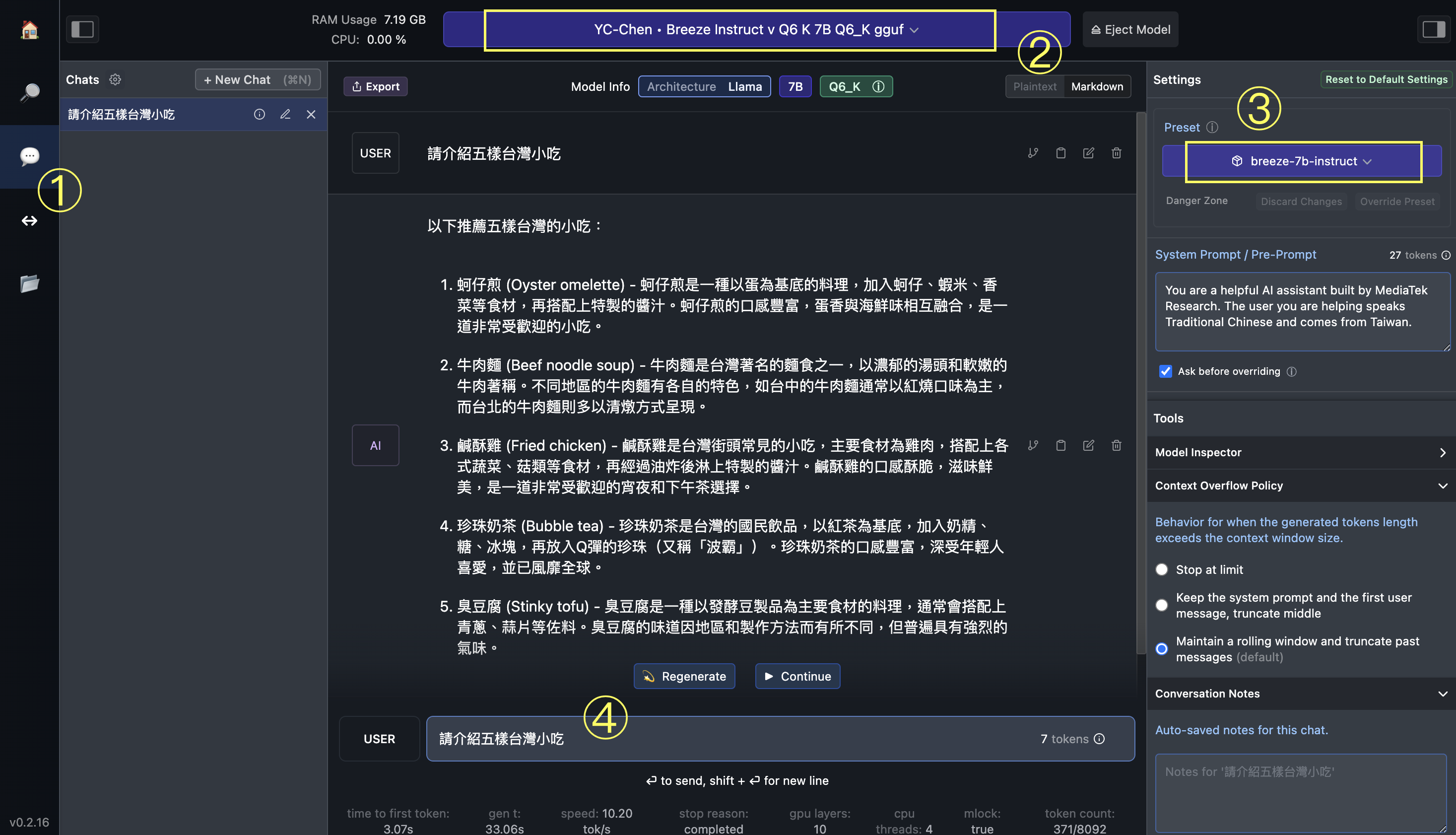metadata
license: apache-2.0
language:
- zh
- en
pipeline_tag: text-generation
GGUF: Breeze-7B-Instruct-v1_0
Use llama.cpp to convert Breeze-7B-Instruct-v1_0 into 3 GGUF models.
| Name | Quant method | Bits | Size | Use case |
|---|---|---|---|---|
| breeze-7b-instruct-v1_0-q4_k_m.gguf | Q4_K_M | 4 | 4.54 GB | medium, balanced quality - recommended |
| breeze-7b-instruct-v1_0-q5_k_m.gguf | Q5_K_M | 5 | 5.32 GB | large, very low quality loss - recommended |
| breeze-7b-instruct-v1_0-q6_k.gguf | Q6_K | 6 | 6.14 GB | very large, extremely low quality loss |
How to locally use those models by UI
Download the app from LM Studio
Search "YC-Chen/Breeze-7B-Instruct-v1_0-GGUF"
- Download the preset
breeze_7b_instruct.preset.jsonand the ggufbreeze-7b-instruct-v1_0-q6_k.gguf
- Choose the right model/preset and start conversation
How to locally use those models by Python codes
- Install ctransformers
Run one of the following commands, according to your system:
# Base ctransformers with no GPU acceleration
pip install ctransformers
# Or with CUDA GPU acceleration
pip install ctransformers[cuda]
# Or with AMD ROCm GPU acceleration (Linux only)
CT_HIPBLAS=1 pip install ctransformers --no-binary ctransformers
# Or with Metal GPU acceleration for macOS systems only
CT_METAL=1 pip install ctransformers --no-binary ctransformers
- Simple code
from ctransformers import AutoModelForCausalLM
# Set gpu_layers to the number of layers to offload to GPU. Set to 0 if no GPU acceleration is available on your system.
llm = AutoModelForCausalLM.from_pretrained(
"YC-Chen/Breeze-7B-Instruct-v1_0-GGUF",
model_file="breeze-7b-instruct-v1_0-q6_k.gguf",
model_type="mistral",
context_length=8000,
gpu_layers=50)
from transformers import AutoTokenizer
tokenizer = AutoTokenizer.from_pretrained("MediaTek-Research/Breeze-7B-Instruct-v1_0")
gen_kwargs = dict(
max_new_tokens=1024,
repetition_penalty=1.1,
stop=["[INST]"],
temperature=0.0,
top_p=0.0,
top_k=1,
)
chat = [
{"role": "system", "content": "You are a helpful AI assistant built by MediaTek Research. The user you are helping speaks Traditional Chinese and comes from Taiwan."},
{"role": "user", "content": "請介紹五樣台灣小吃"}
]
for text in llm(tokenizer.apply_chat_template(chat, tokenize=False), stream=True, **gen_kwargs):
print(text, end="", flush=True)
# 以下推薦五樣台灣的小吃:
#
# 1. 蚵仔煎 (Oyster omelette) - 蚵仔煎是一種以蛋、麵皮和蚵仔為主要食材的傳統美食。它通常在油鍋中煎至金黃色,外酥內嫩,並帶有一股獨特的香氣。蚵仔煎是一道非常受歡迎的小吃,經常可以在夜市或小吃店找到。
# 2. 牛肉麵 (Beef noodle soup) - 牛肉麵是台灣的經典美食之一,它以軟嫩的牛肉和濃郁的湯頭聞名。不同地區的牛肉麵可能有不同的口味和配料,但通常都會包含麵條、牛肉、蔬菜和調味料。牛肉麵在全台灣都有不少知名店家,例如林東芳牛肉麵、牛大哥牛肉麵等。
# 3. 鹹酥雞 (Fried chicken) - 鹹酥雞是一種以雞肉為主要食材的快餐。它通常會經過油炸處理,然後搭配多種蔬菜和調味料。鹹酥雞的口味因地區而異,但通常都會有辣、甜、鹹等不同風味。鹹酥雞經常可以在夜市或路邊攤找到,例如鼎王鹹酥雞、鹹酥G去等知名店家。
# 4. 珍珠奶茶 (Bubble tea) - 珍珠奶茶是一種以紅茶為基底的飲品,加入珍珠(Q彈的小湯圓)和鮮奶。它起源於台灣,並迅速成為全球流行的飲料。珍珠奶茶在全台灣都有不少知名品牌,例如茶湯會、五桐號等。
# 5. 臭豆腐 (Stinky tofu) - 臭豆腐是一種以發酵豆腐為原料製作的傳統小吃。它具有強烈的氣味,但味道獨特且深受台灣人喜愛。臭豆腐通常會搭配多種調味料和配料,例如辣椒醬、蒜泥、酸菜等。臭豆腐在全台灣都有不少知名店家,例如阿宗麵線、大勇街臭豆腐等。


